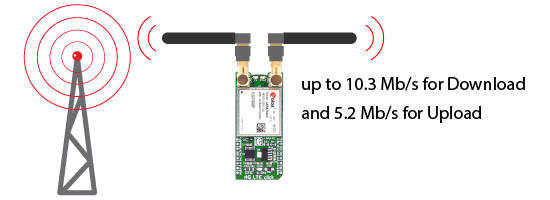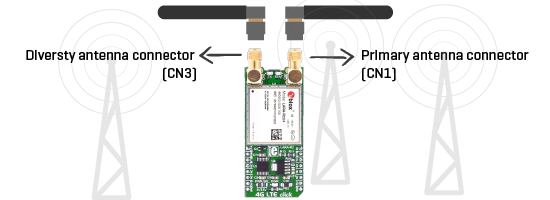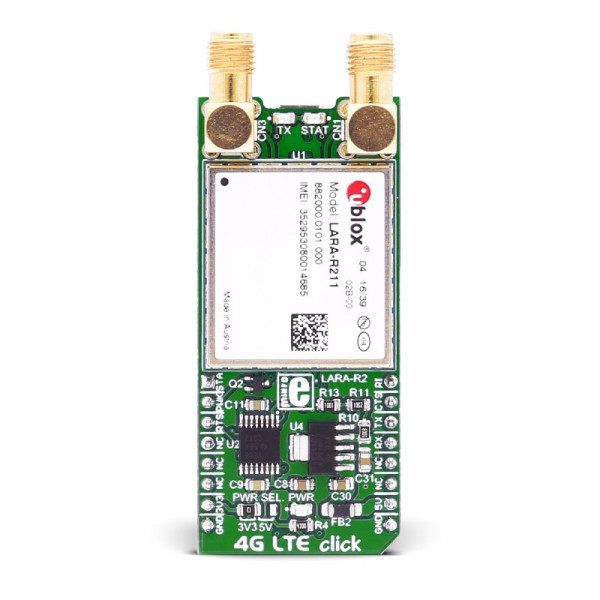- Order number: MIKROE-2527
- Manufacturer product ID: MIKROE-2527
4G LTE-E click carries the LARA-R211 multi-mode cellular module from u-blox. The board is designed to use 5V power supply. I/O voltage levels could be 3.3V or 5V. It communicates with the target microcontroller over UART interface, with additional functionality provided by the following pins on the mikroBUS™ line: AN, RST, CS, PWM, INT.

Note: The North America version of the 4G LTE click is also available.
LARA-R211 overview
With a range of interface options and an integrated IP stack, the modules are designed to support a wide range of data-centric applications. The unique combination of performance and flexibility make these modules ideally suited for medium speed M2M applications, such as smart energy gateways, remote access video cameras, digital signage, telehealth, and telematics.
4G LTE-E click overview
The board has a rich set of components to simplify development: two SMA connectors, a MicroUSB port, as well as a SIM card slot.
The LARA-R211 module specifies data rates of up to 10.3 Mb/s for Download, and 5.2 Mb/s for Upload. The network protocol stack includes support for TCP, UDP, PPP, MMS, FTP, SMTP, SMTPS, HTTP, HTTPS, PING, and SSL. It covers following LTE bands: 3, 7, 20.
Antenna interfaces - The module has two RF pins with a characteristic impedance of 50 Ω. The primary antenna pin (ANT1) supports both Tx and Rx, providing the main antenna interface, while the secondary antenna pin (ANT2) supports Rx only for the LTE Rx diversity configuration.

A diversity antenna only covers the Rx frequencies, and its job is to acquire an independent sample of data. The application in which you are using the click board can then choose the receive signal it wants to use.
Free u-blox software
u-blox offers m-centre, a free evaluation software for all their cellular modules. It is an easy to use graphical interface where you can configure the module and save the changes on EPROM. You can also view and edit SIM phonebook entries, send text messages, and communicate with the wireless module using AT commands.
4G LTE explained
Simply put 4G is the fourth generation of the cellular network standard. This fourth generation does not support traditional circuit-switched telephony service, but all IP based communication such as IP telephony.
If you are not familiar with cellular network standards and protocols and are not sure whether you need GSM or 3G or 4G, read our learn.mikroe.com article about 2G/3G/4G to get a better understanding.
LTE or Long Term Evolution, or 4G LTE as it is most commonly called has different categories defined. There are nine different ones so far. LARA-R211 module supports the LTE Cat 1.
Specifications
| Type | GSM |
| Applications | medium speed M2M applications, such as smart energy gateways, remote access video cameras, digital signage, telehealth, and telematics, and more |
| On-board modules | LARA-R211 cellular module from u-blox |
| Key Features | Data rates of up to 10.3 Mb/s for Download, Data rates of up to 5.2 Mb/s for Upload, Covering the following LTE bands: 3, 7, 20, Micro SIM card socket, SMA antenna connectors, micro USB connector |
| Interface | UART,GPIO |
| Input Voltage | 3.3V or 5V |
| Compatibility | mikroBUS |
| Click board size | L (57.15 x 25.4 mm) |
Pinout diagram
This table shows how the pinout on 4G LTE-E click corresponds to the pinout on the mikroBUS™ socket (the latter shown in the two middle columns).
Jumpers and settings
| Designator | Name | Default Position | Default Option | Description |
|---|---|---|---|---|
| JP1 | I/O SEL. | Left | 3V3 | Power Supply Voltage Selection 3V3/5V, left position 3v3, right position 5v |
Buttons and LEDs
| Designator | Name | Type (LED, BUTTON...) | Description |
|---|---|---|---|
| LD1 | NET | LED | Network status LED. |
| LD2 | STAT. | LED | Module Power On status. |
Programming
Code examples for 4G LTE-E click, written for MikroElektronika hardware and compilers are available on Libstock.
Code snippet
The following code snippet shows the SMS composing function. The SMS_RECEIVER is a phone number which will receive the SMS.
01 void C4G_replyToCaller()
02 {
03 char tmp[ 30 ];
04 char cmdContent[ 30 ];
05 char replyContent[ 256 ];
06 strcpy( cmdContent, "AT+CMGS=" );
07 strcat( cmdContent, SMS_RECEIVER );
08 strcpy( replyContent, "4G LTE by MikroE rocks!" );
09 AT_cmdDouble( cmdContent, replyContent );
10 }
- Do you have any questions concerning this product?
- mikroBUS™ Standard specification
- 4G LTE-E click example on Libstock
- 4G LTE-E click schematic
- LARA-R2 datasheet
- Learn: 2G/3G/4G – Is is all about speed
- m-center software
- 4G LTE-E click 2D and 3D files
- Click Boards™ Catalog
- Further products by MikroElektronika









